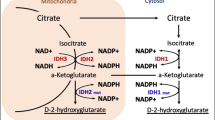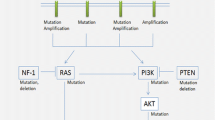Abstract
Expression of astrocyte-elevated gene-1 (AEG-1), a novel oncoprotein, has been shown to promote cell growth and inhibit apoptosis, but the underlying molecular mechanisms and its functional significance in non-small cell lung cancer (NSCLC) remain to be elucidated. In the present study, statistical analysis displayed a significant correlation of AEG-1 expression with clinical staging (P = 0.048), differentiation (P = 0.019) and lymph node metastasis (P = 0.032). Simultaneously, the overall survival time in patients with higher AEG-1 expression was obviously shorter than that in patients with lower expression of AEG-1 (P < 0.001). Furthermore, we found that AEG-1 could inhibit apoptotic cell death in L-78 cells, as assessed by MTT, TUNEL and flow cytometry assay. After treating L-78 cells with AEG-1 siRNA, caspase-3 protein was significantly up-regulated and Bcl-2 protein was markedly decreased in L-78 cells, which was verified by the immunohistochemistry results about AEG-1, caspase-3 and Bcl-2. Furthermore, PI3K p110 protein and phosphorylated Akt were also largely attenuated by the treatment of AEG-1 siRNA. In conclusion, our results indicated that AEG-1 played a crucial role in the carcinogenesis of NSCLC and could inhibit apoptosis via activating cell survival signaling (enhancing the level of anti-apoptotic protein Bcl-2 and the activation of PI3K/Akt pathway).





Similar content being viewed by others
References
Su ZZ, Kang DC, Chen Y, et al. Identification and cloning of human astrocyte genes displaying elevated expression after infection with HIV-1 or exposure to HIV-1 envelope glycoprotein by rapid subtraction hybridization, RaSH. Oncogene. 2002;21:3592–602.
Su ZZ, Chen Y, Kang DC, et al. Customized rapid subtraction hybridization (RaSH) gene microarrays identify overlapping expression changes in human fetal astrocytes resulting from human immunodeficiency virus-1 infection or tumor necrosis factor-alpha treatment. Gene. 2003;306:67–78.
Kang DC, Su ZZ, Sarkar D, et al. Cloning and characterization of HIV-1-inducible astrocyte elevated gene-1, AEG-1. Gene. 2005;353:8–15.
Brown DM, Ruoslahti E. Metadherin, a cell surface protein in breast tumors that mediate lung metastasis. Cancer Cell. 2004;5:365–74.
Kikuno N, Shiina H, Urakami S, et al. Knockdown of astrocyte-elevated gene-1 inhibits prostate cancer progression through upregulation of FOXO3a activity. Oncogene. 2007;26:7647–55.
Yoo BK, Emdad L, Su ZZ, et al. Astrocyte elevated gene-1 regulates hepatocellular carcinoma development and progression. J Clin Invest. 2009;119:465–77.
Yu C, Chen K, Zheng H, et al. Overexpression of astrocyte elevated gene-1 (AEG-1) is associated with esophageal squamous cell carcinoma (ESCC) progression and pathogenesis. Carcinogenesis. 2009;30:894–901.
Lee SG, Jeon HY, Su ZZ, et al. Astrocyte elevated gene-1 contributes to the pathogenesis of neuroblastoma. Oncogene. 2009;28:2476–84.
Hu G, Chong RA, Yang Q, et al. MTDH activation by 8q22 genomic gain promotes chemoresistance and metastasis of poor prognosis breast cancer. Cancer Cell. 2009;15:9–20.
Emdad L, Sarkar D, Lee SG, et al. Astrocyte elevated gene-1 (AEG-1): a novel target for human glioma therapy. Mol Cancer Ther. 2010;9:79–88.
Song L, Li W, Zhang H, et al. Overexpression of AEG-1 significantly associates with tumor aggressiveness and poor prognosis in human non-small cell lung cancer. J Pathol. 2009;219:317–26.
Han YH, Kim SZ, Kim SH, et al. Arsenic trioxide inhibits the growth of Calu-6 cells via inducing a G2 arrest of the cell cycle and apoptosis accompanied with the depletion of GSH. Cancer Lett. 2008;18:40–55.
Franke TF, Hornik CP, Segev L, et al. PI3K/Akt and apoptosis: size matters. Oncogene. 2003;22:8983–98.
Franke TF, Yang SI, Chan TO, et al. The protein kinase encoded by the Akt proto-oncogene is a target of the PDGF-activated phosphatidylinositol 3-kinase. Cell. 1995;81:727–36.
del Peso L, González-García M, Page C, et al. Interleukin-3-induced phosphorylation of BAD through the protein kinase Akt. Science. 1997;278:687–99.
Cardone MH, Roy N, Stennicke HR, et al. Regulation of cell death protease caspase-9 by phosphorylation. Science. 1998;282:1318–21.
Dan HC, Sun M, Kaneko S, et al. Akt phosphorylation and stabilization of X-linked inhibitor of apoptosis protein (XIAP). J Biol Chem. 2004;279:5405–12.
Lee SG, Su ZZ, Emdad L, et al. Astrocyte elevated gene-1 (AEG-1) is a target gene of oncogenicHa-ras requiring phosphatidylinositol 3-kinase and c-Myc. Proc Natl Acad Sci USA. 2006;103:17390–5.
Lee SG, Su ZZ, Emdad L, et al. Astrocyte elevated gene-1 activates cell survival pathways through PI3K-Akt signaling. Oncogene. 2008;27:1114–21.
Ke Z, Zhang X, Ma L, et al. Expression of DPC4/Smad4 in non-small-cell lung carcinoma and its relationship with angiogenesis. Neoplasma. 2008;55:323–9.
Emdad L, Sarkar D, Su ZZ, et al. Astrocyte elevated gene-1: recent insights into a novel gene involved in tumor progression, metastasis and neurodegeneration. Pharmacol Ther. 2007;114:155–70.
Li J, Zhang N, Song LB, et al. Astrocyte elevated gene-1 is a novel prognostic marker for breast cancer progression and overall patient survival. Clin Cancer Res. 2008;14:3319–26.
Jian-bo X, Hui W, Yu-long H, et al. Astrocyte-elevated gene-1 overexpression is associated with poor prognosis in gastric cancer. Med Oncol. 2011;28:455–62.
Song H, Li C, Li R, et al. Prognostic significance of AEG-1 expression in colorectal carcinoma. Int J Colorectal Dis. 2010;25:1201–9.
Emdad L, Sarkar D, Su ZZ, et al. Activation of the nuclear factor kappaB pathway by astrocyte elevated gene-1: implications for tumor progression and metastasis. Cancer Res. 2006;66:1509–16.
Hermine O, Haioun C, Lepage E, et al. Prognostic significance of bcl-2 protein expression in aggressive non-Hodgkin’s lymphoma. Grouped’Etude des Lymphomes de l’Adulte (GELA). Blood. 1996;87:265–72.
Wang W, Abbruzzese JL, Evans DB, et al. The nuclear factor-kappa B RelA transcription factor is constitutively activated in human pancreatic adenocarcinoma cells. Clin Cancer Res. 1999;5:119–27.
Vivanco I, Sawyers CL. The phosphatidylinositol 3-kinase AKT pathway in human cancer. Nat Rev Cancer. 2002;2:489–501.
Johnson DE. Programmed cell death regulation: basic mechanisms and therapeutic opportunities. Leukemia. 2000;14:1340–4.
Cho SG, Choi EJ. Apoptotic signaling pathways: caspases and stress-activated protein kinases. J Biochem Mol Biol. 2002;35:24–7.
Higuchi M, Honda T, Proske RJ, et al. Regulation of reactive oxygen species-induced apoptosis and necrosis by caspase 3-like proteases. Oncogene. 1998;17:2753–60.
Cory S, Huang DC, Adams JM. The Bcl-2 family: roles in cell survival and oncogenesis. Oncogene. 2003;22:8590–607.
Datta SR, Dudek H, Tao X, et al. Akt phosphorylation of BAD couples survival signals to the cell-intrinsic death machinery. Cell. 1997;91:231–9.
Yao R, Cooper GM. Requirement for phosphatidyl-inositol-3 kinase in the prevention of apoptosis by the nerve growth factor. Science. 1995;267:2003–6.
Pugazhenthi S, Nesterova A, Sable C, et al. Akt/protein kinase B up-regulates Bcl-2 expression through cAMP-response element-binding protein. J Biol Chem. 2000;275:10761–6.
Acknowledgments
This study was supported by Foundation of China National Natural Science (30900650/H1615), Foundation of China National Natural Science (81172232/H1615), Foundation of Guangdong Natural Science (9451008901002146), the Fund for the Preceptorial Program of Higher Education, China, Grant number: 20090171120070, and Guangzhou science and technology program[2010]122010u1-E00621.
Conflict of interest
All authors declare that there is no conflict of interest in this scientific work.
Author information
Authors and Affiliations
Corresponding author
Additional information
Zun-fu Ke and Xiaopeng Mao have the same attribution to this article.
Rights and permissions
About this article
Cite this article
Ke, Zf., Mao, X., Zeng, C. et al. AEG-1 expression characteristics in human non-small cell lung cancer and its relationship with apoptosis. Med Oncol 30, 383 (2013). https://doi.org/10.1007/s12032-012-0383-9
Received:
Accepted:
Published:
DOI: https://doi.org/10.1007/s12032-012-0383-9




